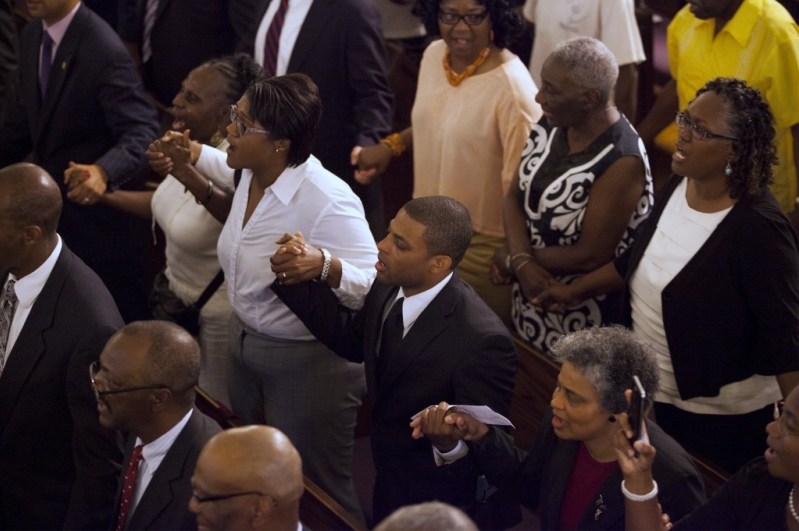
Faith can furnish a beneficial, sturdy path related to challenges specifically faced by African-American and Latino minorities, claim the authors of a new book entitled "Soul Mates: Religion, Sex, Love, and Marriage Among African Americans and Latinos." The book reflects what the authors believe to be the first study of religion and family life among blacks and Latinos.
University of Virginia sociologist W. Bradford Wilcox collaborated with Nicholas Wolfinger of the University of Utah for the study and found that African-American and Latino couples who attend church together experience happier relationships and family life, reports NBC 29.
"By 2050, a majority of Americans will be minorities. Yet scholars know little about faith and family life among non-white Americans," said Wilcox.
Religion doesn't offer a magic pill for successful living, but church participation is clearly associated with positive outcomes in relationships and family life, Wilcox and Wolfinger found. They stated this bears out even in the midst of lower marriage rates and higher cohabiting rates among all races.
The two authors pursued the central question: "Is religion achieving success in creating the conditions where relationships, marriages and families can flourish in black and Latino communities?"
Wilcox and Wolfinger analyzed six national data sets and conducted more than 100 interviews in several cities. Data included information from Wilcox's year (2005-2006) of New York fieldwork in Harlem, Brooklyn and the Bronx, during which time he visited churches and spoke to clergy and parishioners.
"One big reason so many families of color are thriving is that they tend to be more religious than the average American," said Wilcox, director of the National Marriage Project.
An estimated 50,000 congregations serve blacks and Latinos in the United States, at which 36 percent of African-Americans and 29 percent of Latinos attend church frequently (several times a month or more).
"Our book shows that churches are achieving an important measure of success in fostering lower rates of non-marital childbearing, more marriage, and happier relationships among blacks and Latinos," the authors write.
Unmarried churchgoers also are more likely to get married, compared to similar couples who do not regularly go to church, said the researchers.
A majority of blacks and Latinos value marriage more than single living, and most will marry at some point in their lives, cited the authors. In fact, 56 percent of blacks and 68 percent of Latinos feel it is better to be married than to be single, compared to 54 percent of whites.
Wilcox and Wolfinger considered social, cultural, historical and economic factors that help and hinder marriage and its stability.
"Soul Mates" found 80 percent of Latinos report being happy in their relationships when both partners attend church, compared to 71 percent for Latino couples who don't go to church. With black couples, 78 percent who attended church reported being happy while the figure for non-church going couples drops to 69 percent. (The figures for white couples are 79 percent and 70 percent, respectively.)
Wilcox emphasizes the influence of religion on men. He and Wolfinger maintain that "shared faith supplies moral, social and spiritual solidarity and that religion seems especially important in turning men's hearts and minds toward their wives or partners."
Churches foster an ethic of care and reinforce a code of decency, they write. They define "code of decency" as "hard work, lawful behavior, temperance, and sexual fidelity in married and unmarried relationships."
"Religious faith makes for better men," Wilcox said.
"Black and Latino men who attend church are more likely to be employed, to steer clear of substance abuse, and to avoid incarceration."





![[Exclusive Interview] A revelation within the brink of life and death — Meg Leung’s mission in Christian art](https://www.gospelherald.com/media/cache/thumbnail/7/21/72163sp_273w_150h_1x_1y.jpg)

